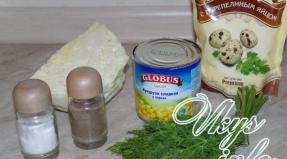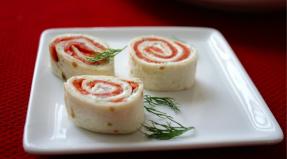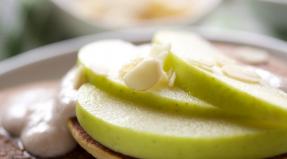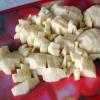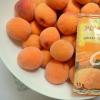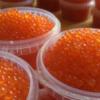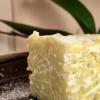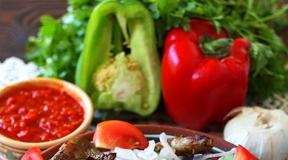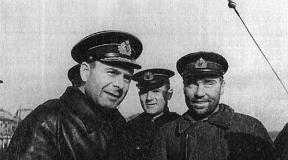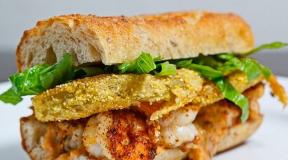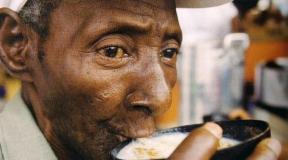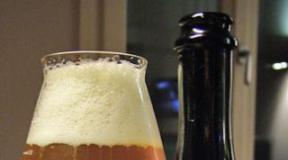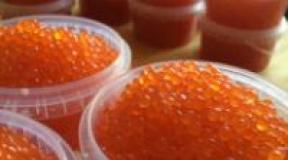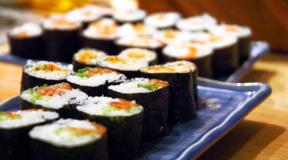The history of mayonnaise. How did mayonnaise appear in the USSR? (5 photos)
Mayonnaise. History of appearance
AND The mayonnaise sauce, invented by the French, has become one of the most popular sauces in Europe and is present in almost all cuisines of the world, and in Russia it has become almost a national Russian product.
M ayonnaise is a cold sauce, its main ingredients are vegetable oil, egg yolks, vinegar, sugar and salt.
WITH There are several versions of the origin of both the mayonnaise itself and the word "mayonnaise".
NS about one of the versions, the word "mayonnaise" comes from the old French "moyeu", which, among other meanings, meant "yolk". According to another version, this word is of geographical origin and comes from the name of the capital of the Spanish island of Menorca - the city of Mahón.
AND a couple of versions of sauce making mayonnaise. The most popular is the version about the creation of mayonnaise in the 19th century in the city of Mahon, and here there are also at least two versions.
NS about one of them mayonnaise was created in 1757 during the capture of the city by the French under the leadership of the Duke de Richelieu, and forced to hold it after the siege by the British. Then, due to the scarcity of food - only olive oil and eggs remained - the resourceful chef rubbed fresh egg yolks with sugar and salt and gradually, adding in small portions and each time actively stirring until completely homogeneous, mixed everything with olive oil, then added lemon juice and mix everything thoroughly again. So a unique sauce was invented, with which even a simple soldier's bread became amazingly tasty. And the recipe of this unknown chef has become a classic recipe for "maon sauce" (in French "mayonnaise") or "mayonnaise".
D Another version of the origin of mayonnaise is also associated with the events in Mahon, but this time in 1782, when the city was conquered by the Spaniards, commanded by a Frenchman in the Spanish service, Duke Louis de Crillon, and for a large feast in honor of the victory, the duke ordered the cooks to cook something "Very special", which is what became an unprecedented sauce made from the best Provencal olive oil, eggs and lemon juice with the addition of salt, sugar and red pepper.
NS about the third version, mayonnaise originated from the "ali-oli" sauce (translated from Spanish - "garlic-and-butter"), known to the inhabitants Southern Europe from time immemorial, and has come down to our days under the name "aoli". Virgil wrote about this seasoning ...
TO Be that as it may, and despite all the theoretical disputes about the origin of mayonnaise, at the end of the 18th century, this wonderful sauce firmly entered the menu of European aristocrats and became classic dressing for cold appetizers, although it was very expensive in those days. This was due to the fact that the cooks who owned the recipe for making mayonnaise kept it in big secret, although preparation of mayonnaise is not difficult, it requires certain skills and knowledge of cooking technology.
V early 19th century chef Olivier from a family of famous French chefs invented a version of mayonnaise with the addition of mustard and a small amount of some secret seasonings (the composition of these seasonings is now lost). The mustard gave the mayonnaise a special spicy taste and, being a natural natural emulsifier, greatly simplified its preparation and improved storage stability. This is how a spicier milenaise, called "Provencal sauce from Mahon" - "Provencal" mayonnaise, or simply Provencal sauce, has turned out.
AND It was the Provencal mayonnaise, used by Lucien Olivier, a native of this family, who moved to Russia and became a famous Russian restaurateur, and provided a wonderful taste to the Olivier salad he invented.
H Despite the simplicity of preparation and a set of simple and affordable ingredients, mayonnaise has become one of the wonders of the world culinary arts... This is not only a highly nutritious product in itself, it also contributes to the easy assimilation of the food taken with it and is excellent seasoning to many dishes.
History of mayonnaise in Russia
NS The search industry of the country began producing mayonnaise in 1936 in Moscow. It was Provencal mayonnaise. It was produced at the Shelepikha production site, which later became part of the Moscow Fat Plant. The classic Provencal mayonnaise was even included in grocery set issued by cards.
D Other types of mayonnaise began to be produced only in the post-war period. The Vesenny mayonnaise recipe provided for the addition of dill oil, there were mayonnaises with other additives, mayonnaise with 30% tomato paste intended for fish and fish salads, with 20% grated horseradish - for cold meat dishes, with 25% finely chopped gherkins and capers - to fried meat, with 15% "Yuzhny" sauce - for meat and vegetable salads. Sugar-free mayonnaise was produced for diabetics.
NS Later, with the development of the chemical industry, Soviet mayonnaise began to lose its high quality due to the introduction of unwanted additives. Now Russian store mayonnaise for the most part, they are only a "mayonnaise-like product", since modern Russian state standards allow calling a product that is not mayonnaise. So, according to GOST, manufacturers can use a large selection of initial food products and chemical substances, including low-quality vegetable oils, up to rapeseed, soy products, chemical emulsifiers, starch and other ingredients not found in classic mayonnaise and its varieties.
Have strict requirements for the quality of mayonnaise GOST R 53590-2009, which came into force in 2012. According to this GOST, a product containing more than 50% fat and more than 1% egg powder can be called mayonnaise. Although this is far from the real classic mayonnaise sauce ...
Making mayonnaise at home
H real classic sauce Mayonnaise and Provencal mayonnaise can be easily prepared at home. The whole process, with some skill, takes no more than 8-10 minutes.
M ayonnaise is an emulsion of olive oil in raw egg yolk with a little salt, sugar, and lemon juice. Allowed to add up to 0.5% dry fine ground spices (nutmeg, red or black pepper, lemon peel). And nothing else, no water, no milk. Provencal mayonnaise contains mustard.
Mayonnaise birthday
H
Despite the different versions and dates of the invention of mayonnaise, the birthday of perhaps the most popular sauce is May 28, 1756.
NS it is not the oldest sauce, but one of the few, the date of the appearance of which, although controversial, is determined. Therefore, in culinary calendars, the day May 28 marked as Birthday of the wonderful mayonnaise sauce.
Several plausible legends about the origin of mayonnaise have survived to this day. All of them are associated with the turbulent history of the 18th century. You can learn something about these times by watching the films "Holidays of Love", "Fanfan-Tulip", "Follow Me, Canals!", The TV movie "Mikhailo Lomonosov". In these funny films, we will also get acquainted with the methods of active conscription into the then army, very similar to those in Russia at the beginning of the third millennium.
In the Mediterranean Sea lies the island of Menorca. Its capital is the ancient city of Mahon (or Mayon). In the 18th century, continuous wars were fought over this fertile land between European rulers. In the midst of those battles, the history of mayonnaise sauce began.
First, in 1757, Mahon was captured by the French under the leadership of the Duke de Richelieu (a relative of the same Duke and Cardinal Armand Jean du Plessis Richelieu, who lived from 1585 to 1642, who besieged the Huguenot fortress of La Rochelle, which fell in 1628 in the Three Musketeers) , and in the siege of which the royal musketeer Rene Descartes actually took part). The city was soon besieged by the British. Like his ancestor, Richelieu was going to hold the position even on pain of starvation to the bitter end.
And food in the besieged city was tense - only olive oil and turkey eggs remained. How much can you cook from such a set? The garrison cooks, who themselves were fed up with such a meager "menu", during the siege tried to diversify it with all their might, experimented as best they could, but the set available products was too meager.
When the French garrison and Richelieu himself could no longer look at all sorts of omelets and scrambled eggs, the duke's chef, who also displayed an outstanding soldier's ingenuity, eventually found perfect solution, which forever glorified him, but, unfortunately, did not preserve his name (in a difficult siege struggle, he forgot to call the sauce by his name).
So, this resourceful chef carefully ground fresh egg yolks with sugar and salt and gradually, adding in small portions and each time actively stirring until completely homogeneous, mixed everything with olive oil, then added lemon juice to the mixture and mixed everything thoroughly again. (This is the classic mayonnaise recipe.)
Even the simplest soldier's bread with such an addition became amazingly tasty!
Richelieu and his soldiers were delighted. Victory over the enemy was assured! This is how a wonderful sauce appeared, later named after the besieged city - "Mahon sauce" or "mayonnaise".
This magnificent new seasoning has gained worldwide fame under the name "Provencal sauce from Mahon", or simply in French "mayonnaise".
Another version of the origin of mayonnaise also tells us about the events in Mahon, this time in 1782. The city was then conquered by the Spaniards, commanded by a Frenchman in Spanish service, Duke Louis de Crillon. This time, the reason for the invention of the sauce was not the scarcity of food, but its abundance. A great feast was given to celebrate the victory, and the duke ordered the cooks to prepare something "very special." And then an unprecedented sauce appeared on the banquet tables, made from the best Provencal olive oil, eggs and lemon juice with the addition of sugar, salt and red pepper.
This version is very doubtful, since in a short time of preparation for a feast, it is simply impossible to make a fundamentally new invention in cooking, even "by the boss's order". Any development of a new idea and bringing it "to mind" takes a lot of time. All inventors know this.
But there is one more hypothesis. She says that mayonnaise did not come from Mahon at all, it has even deeper roots! Imagine, - connoisseurs of culinary tell us, - would a person in his right mind just take olive oil and eggs and mix them, not even imagining what unexpected result he will get in the end? No, whoever the cook in the city of Mahon was, he probably relied on someone's experience and knew what he was doing. However, who would doubt that a person, even if he is a cook, taking a step into the unknown, bases his actions on previous experience?
So the fact remains - until that time there was no mayonnaise sauce. Mayonnaise was invented by a French chef in Mahon, of course, drawing on his previous culinary knowledge and experience.
Indeed, mayonnaise had a direct ancestor - a spicy Spanish sauce "ali-oli", translated from Spanish - "garlic-and-butter". This is a cool mixture of garlic, eggs, and olive oil. Residents of southern Europe knew and loved "ali-oli" from time immemorial. The ancient Roman poet Virgil wrote about such a seasoning. This sauce has survived to this day under the name "aoli". But this is not mayonnaise at all!
However, adherents of this hypothesis still want to be sure that the French nobles in the 18th century simply made public old recipe and gave him a French name. And then the fame of him spread throughout France.
In this version, it is very difficult to explain why - if such wonderful recipe was created a long time ago - has it never been used before? And there can be only one explanation - because it did not exist.
But in any case, despite these theoretical disputes, a wonderful, previously unknown sauce precisely at the end of the 18th century firmly entered the menu of European aristocrats and became a classic dressing for cold snacks.
In those days, mayonnaise was very expensive, because the chefs who knew the recipe for making mayonnaise kept it a big secret - although it is not difficult to prepare mayonnaise, it requires a certain skill and knowledge of cooking technology.
At the beginning of the 19th century, a chef from a family of famous French chefs, Olivier, invented a version of mayonnaise with the addition of mustard and a small amount of some secret seasonings (the composition of these seasonings has now been lost). Mustard gave the mayonnaise a special piquant taste and, being a natural natural emulsifier, greatly simplified its preparation, improved its shelf-life. This sauce, spicier than the classic mayonnaise invented in Mahon, was called "Provencal sauce from Mahon" - "Provencal" mayonnaise (Provencal sauce).
Later, a native of this family, Lucien Olivier moved to live in Russia, where he became a famous Russian restaurateur. While working in Russia, he made an invaluable contribution to the creation of the richness and diversity of modern Russian cuisine, which has now absorbed and improved all the best from many national and court cuisines of the peoples of the world.
It was Provencal mayonnaise that provided excellent taste invented by Lucien Olivier to the Russian national salad"Olivie".
There are several versions of the invention of mayonnaise, mostly legendary and associated with significant historical events. One of the stories tells that the word "mayonnaise" is of geographical origin and is associated with the name of the city of Mahón, the capital of the Spanish island of Menorca.
As stated in one of the French encyclopedic dictionaries, Mahon was conquered by the Duke of Richelieu. In 1758 the British laid siege to this city. The French ran out of food supplies, with the exception of eggs and olive oil. From these products, the chefs prepared scrambled eggs and omelets, which were pretty boring to the French officers. The Duke of Richelieu ordered his chef to prepare some new dish. The resourceful chef beat the eggs with butter and seasoned the mixture with salt and spices. The sauce they liked was named "mayonnaise" after the city of Mahon.
In Menorca itself, mayonnaise is called salsa mahonesa (Mahon sauce). It is possible that this simple sauce originated independently in several places in the Mediterranean - where there is olive oil and eggs.
Who developed the recipe for the famous Provencal mayonnaise?
At the beginning of the 19th century, a chef from a family of famous French chefs, Olivier, invented a version of mayonnaise with the addition of mustard and a small amount of seasonings (the composition of these seasonings has been lost). Mustard gave the mayonnaise a special piquant taste and, being a natural natural emulsifier, greatly simplified its preparation, improved its shelf-life. This sauce, spicier than the classic mayonnaise invented in Mahon, was called "Provencal sauce from Mahon" - "Provencal" mayonnaise.
Later, a native of this family, Lucien Olivier moved to live in Russia, where he became a famous Russian restaurateur. It was Provencal mayonnaise that ensured the excellent taste of the famous Olivier salad invented by Lucien. I must say that original recipe mayonnaise is not suitable for long-term storage, in connection with which a recipe was developed for industrial production, also called "mayonnaise".
Production of the first Soviet mayonnaise Provencal started in Moscow in 1936. The novelty was taken to Stalin for trial. The country's top leadership liked the mayonnaise, and it was even included in the rationed grocery set. The classic "Provencal" has since become the most favorite mayonnaise of Russians, and long time remained the only mayonnaise in the country.
What should be the recipe for classic Provencal?
It must be said that the recipe for the classic Provencal, familiar to the consumer since Soviet times, has undergone significant changes. Unfortunately, most manufacturers who call their product "Provencal" use a different recipe.
This does not mean that the buyer receives a low-quality product, but its taste is very different from what was called mayonnaise in the USSR. The composition of the Soviet mayonnaise included only the following natural ingredients: oil, egg yolk, vinegar, salt, sugar. The fat content of the product was 68%, while by modern standards, the fat content of mayonnaise can be at least 50%. Products with lower fat content belong to mayonnaise sauces... But the legislation does not stipulate which mayonnaise can belong to the Provencal category. Therefore, now such labels are more often a marketing ploy than a manufacturer's desire to recreate a traditional recipe.
, sugar, table salt, sometimes mustard and other spices.
History
The origin of the word "mayonnaise" in French unknown. Larousse Gastronomique 1961 is of the opinion that the word is derived from the old French "moyeu" which, among other things, meant yolk.
There are other versions of its origin, mostly legendary and based on striking historical events. Here is one of them:
The word "mayonnaise" is of geographical origin and is associated with the name of the city of Mahon - the capital of the Spanish island of Menorca, which is part of the Balearic Islands. As stated in one of the French encyclopedic dictionaries, Mahon was conquered by the Duke of Richelieu. In 1758 the British laid siege to this city. The French ran out of food supplies, with the exception of eggs and olive oil. From these products, the chefs prepared scrambled eggs and omelets, which were pretty boring to the French officers. The Duke of Richelieu ordered his chef to prepare some new dish. The resourceful chef beat the eggs with butter and seasoned the mixture with salt and spices. The sauce they liked was named "mayonnaise" after the city of Mahon.
In Menorca itself, mayonnaise is called salsa mahonesa (Mahon sauce).
It is possible that this simple sauce is quite ancient and originated independently in several places in the Mediterranean - where there is olive oil and eggs.
There is another version that mayonnaise originated from the ali-oli sauce (garlic, ground with olive oil), known from time immemorial.
Traditional composition
The original mayonnaise recipe consists of egg yolk, vinegar, vegetable oil, salt and pepper (spice). You can add various ingredients for aroma - lemon, mustard, which improves the elasticity of the emulsion. In Germany and the Netherlands, mayonnaise is traditionally slightly sweetened.
For Russia and the CIS countries, sunflower oil and mustard oil are very often used as the main ingredients. In other countries, olive oil and pureed mustard are very often used.
Industrial mayonnaise
Manufactured mayonnaise follows the usual recipe, but uses refined oils, as well as milk and eggs in the form of egg powder and milk powder. Purification of oils by refining and eggs and milk by pasteurization is carried out to destroy bacteria and viruses to increase the shelf life of mayonnaise, as well as to reduce the risk of food poisoning for consumers both from damage to the mayonnaise itself and from spoilage of products for its production during warehouse storage.
Classification
In the Soviet Union, the "Provencal" mayonnaise, produced at many oil and fat factories, was traditionally popular. The recipe and composition of mayonnaise was strictly regulated by the state standard. Mayonnaise was made from traditional products: sunflower oil, water, egg powder, milk powder, salt, sugar, mustard powder, vinegar - and had a fat content of 67%. The only preservative in Provencal mayonnaise was alcohol vinegar.
In Russia, standards in Food Industry, including the standards for mayonnaise, have been significantly liberalized. GOST 30004.1-93 gave great freedom in the choice of composition and application chemical additives... But manufacturers are in no hurry to follow even him, inventing their own specifications. According to GOST 30004.1-93, all ready-made "mayonnaises", depending on their fat content, were divided into classes:
- high-calorie ( mass fraction fat from 55%; water less than 35%)
- medium-calorie (fat mass fraction 40-55%; water 30-50%)
- low-calorie (fat mass fraction up to 40%; water more than 50%)
On July 1, 2012, GOST R 53590-2009 entered into force, which significantly toughens the requirements for the quality of mayonnaise. According to the new GOST, only a product containing at least 50% fat and 1% egg powder can be called mayonnaise. Foods with a fat content of at least 15% can be called "mayonnaise sauce".
Technology
Mayonnaise is a water-in-oil emulsion, traditionally using egg lecithin (egg yolk). Later, it was almost completely supplanted. soy lecithin and other emulsifiers with HLB 8 ... 18.
Shelf life
The original mayonnaise is stored for only a few days, since its recipe includes perishable food... To increase the shelf life, manufacturers use preservatives, refining and pasteurization of components. The shelf life of mayonnaise of various brands ranges from 1 to 7 months.
Influence on the body
Mayonnaise is a flavoring food.
Mayonnaise, along with ketchup, kvass, mushrooms, okroshka, naval pasta and fried eggs, is prohibited for meals in schools, institutions of primary and secondary vocational education in Russia.
Renowned nutritionist, doctor of medical sciences, M.M. Ginzburg notes that the harm of mayonnaise is mostly a philistine myth and it is not the mayonnaise itself that has a bad effect on health, but the imbalance in fat intake and, first of all, excessive consumption of calories.
Mayonnaise itself consists of 60-80% of vegetable sunflower oil, which, unlike animal fats or palm oil, does not lead to the formation of excessive cholesterol, i.e. in the balance of fat intake are one of the safest. Egg powder and milk powder in mayonnaise are not more hazardous to health than eggs and milk. The mustard oil in mayonnaise is very useful product due to omega-3 fats that destroy cholesterol, and mustard oil is one of the most effective means for generating the "happiness hormone" endorphin, which explains the emerging surge of vivacity after drinking mayonnaise and cravings for it.
It should be borne in mind that although the main ingredient of mayonnaise is sunflower oil does not contain cholesterol, nevertheless eggs in the form of powder or natural in the composition of mayonnaise contain a lot of cholesterol. According to the USDA, regular mayonnaise contains 42 mg of cholesterol per 100 grams. For comparison, according to USDA data in eggs - 373 mg, in butter- 215 mg, and for meat - 73 mg per 100 grams. Sometimes it is indicated that cholesterol is destroyed during frying, and salads with mayonnaise are usually served without heat treatment, so mayonnaise is a great source of cholesterol. However, this does not correspond to reality, since cholesterol crystals up to +148 C do not even melt, and cholesterol is destroyed only at +360 C. In addition, it should be borne in mind that egg powder in the composition industrial mayonnaise also undergoes pasteurization at high temperature.
Since at industrial manufacturing of mayonnaise, refined (refined) oils are used, as well as egg and milk powders pasteurized at a high temperature, then there is almost 100% destruction of bacteria and viruses, which explains the long shelf life of industrial manufactured mayonnaise and the extremely low risk of food poisoning by it. During the refining of oils used for industrial mayonnaise, oxidizing agents, such as free fatty acids, that lead to product spoilage are destroyed. Pasteurization of the egg powder makes it impossible to get infected with Salmonella. It should be borne in mind that refining and pasteurization also reduce the amount of vitamins and phosphorus-containing substances. When making mayonnaise according to "home recipes" from natural oils, eggs and milk, more nutrients, but there is an increased risk of food poisoning or infection when they are contaminated with bacteria or viruses.
The health hazard of mayonnaise lies in its very high calorie content of 680 kcal per 100 grams due to the large amount vegetable fats At the same time, the calorie content of mayonnaise under the USDA data is lower than 884 kcal of sunflower oil with the same salad dressing. This is due to the fact that mayonnaise is a water-in-oil emulsion, i.e. sunflower oil is diluted with water, so the calorie content is lower. Moreover, there are also low calorie mayonnaise with even fewer calories. Therefore, more high calorie content mayonnaise regarding oil for salad dressing is another myth.
see also
Write a review on the article "Mayonnaise"
Notes (edit)
Links
- ... Mayonnaise and mayonnaise sauces. General specifications
|
||||||||||||||||||||||||||
An excerpt characterizing Mayonnaise
Jogel had the funniest balls in Moscow. This was said by the mothers, looking at their adolescentes, [girls] making their newly learned steps; this was said by the adolescentes and adolescents themselves, [girls and boys] who danced until they fell; these adult girls and young people who came to these balls with the idea of condescending to them and finding the best fun in them. In the same year, two marriages took place at these balls. Two pretty princesses Gorchakovs found suitors and got married, and all the more they let these balls into glory. What was special at these balls was that there was no host and hostess: there was, like a fluff flying, scuffling, according to the rules of art, good-natured Yogel, who accepted tickets for lessons from all his guests; was that only those who wanted to dance and have fun, as they want it, still went to these balls 13 and 14 summer girls wearing long dresses for the first time. All, with rare exceptions, were or seemed pretty: so enthusiastically they all smiled and so flared up their eyes. Sometimes even the pas de chale danced the best students, of which the best was Natasha, who was distinguished by her gracefulness; but at this last ball only the Ecossaises, the Angleses and the mazurka, which was just coming into fashion, were danced. The hall was taken by Yogel to Bezukhov's house, and the ball was a great success, as everyone said. There were many pretty girls, and the Rostov girls were among the best. They were both especially happy and cheerful. That evening Sonya, proud of Dolokhov's proposal, her refusal and her explanation with Nikolai, was still spinning at home, not allowing the girl to dash her braids, and now she was radiant with impetuous joy through and through.Natasha, no less proud that she was in a long dress for the first time, at a real ball, was even happier. Both wore white muslin dresses with pink ribbons.
Natasha became in love from the very minute she entered the ball. She was not in love with anyone in particular, but she was in love with everyone. She was in love with the one she was looking at the minute she looked.
- Oh, how good! - she kept saying, running up to Sonya.
Nikolai and Denisov walked through the halls, affectionately and patronizingly looking at the dancers.
- How sweet she is, she will be asavitsa, - said Denisov.
- Who?
- G "Athena Natasha," answered Denisov.
“And how she dances, what a ghasta!” He said after a pause for a while.
- Who are you talking about?
- About sisters "at p" about yours, - Denisov shouted angrily.
Rostov chuckled.
- Mon cher comte; vous etes l "un de mes meilleurs ecoliers, il faut que vous dansiez," said little Jogel, going up to Nikolai. "Voyez combien de jolies demoiselles. [My dear count, you are one of my best students. pretty girls!] - He turned to Denisov, also his former student, with the same request.
- Non, mon cher, je fe "ai tapisse" ie, [No, my dear, I'll sit by the wall,] - said Denisov. “Don't you remember how badly I used your lessons?
- Oh no! - Hastily consoling him, said Yogel. - You were only inattentive, but you had the ability, yes, you had the ability.
The newly introduced mazurka was played; Nikolai could not refuse Iogel and invited Sonya. Denisov sat down with the old women and leaned on his saber, stamping the beat, telling something merrily and making the old ladies laugh, looking at the dancing youth. Iogel in the first pair danced with Natasha, his pride and best student. Softly, gently fingering his feet in shoes, Yogel was the first to fly across the hall with Natasha, who was timid but diligently making a pas. Denisov did not take his eyes off her and tapped time with his saber, with an air that clearly said that he himself did not dance only from what he didn’t want, and not from what he couldn’t. In the middle of the figure, he beckoned Rostov, who was passing by.
“It’s not at all,” he said. “Is this a Polish mazurka?” And he dances well. ”Knowing that Denisov was even famous in Poland for his skill in dancing the Polish mazurka, Nikolai ran up to Natasha:
- Go, choose Denisov. Here is dancing! Miracle! - he said.
When Natasha's turn came again, she got up and quickly fingering her shoes with bows, shyly, she ran alone across the hall to the corner where Denisov was sitting. She saw that everyone was looking at her and waiting. Nikolai saw that Denisov and Natasha were arguing with a smile, and that Denisov refused, but smiled happily. He ran up.
“Please, Vasily Dmitritch,” Natasha was saying, “let's go, please.
- Yes, thank you, Mr. Athena, - said Denisov.
- Well, that's enough, Vasya, - said Nikolai.
“They’re trying to persuade Vaska the cat,” Denisov said jokingly.
“I’ll sing to you all evening,” Natasha said.
- The sorceress will do everything to me! - said Denisov and unfastened his saber. He stepped out from behind the chairs, took his lady firmly by the hand, lifted his head and put his foot aside, waiting for the beat. Only on horseback and in the mazurka was Denisov's small stature not visible, and he seemed to be the same fellow as he himself felt. After waiting for the beat, he glanced at his lady from the side, triumphantly and playfully, unexpectedly tapped with one foot and, like a ball, bounced elastically off the floor and flew along in a circle, dragging his lady along with him. He was flying inaudibly half of the hall on one leg, and it seemed that he did not see the chairs standing in front of him and rushed straight towards them; but suddenly, snapping his spurs and spreading his legs, he stopped on his heels, stood there for a second, kicked his feet in one place with a crash of spurs, spun quickly and, snapping his right foot with his left foot, again flew in a circle. Natasha guessed what he intended to do, and, not knowing how, watched him - surrendering herself to him. Now he circled her, now on his right, now on his left hand, now falling to his knees, he drew her around him, and again jumped up and started forward with such impetuosity, as if he intended to run across all the rooms without catching his breath; then suddenly he stopped again and did again a new and unexpected knee. When he, briskly circling the lady in front of her place, snapped his spur, bowing before her, Natasha did not even sit down to him. She stared at him in bewilderment, smiling as if she did not recognize him. - What is it? She said.
Despite the fact that Yogel did not recognize this mazurka as a real one, everyone was delighted with Denisov's skill, they constantly began to choose him, and the old people, smiling, began to talk about Poland and about the good old days. Denisov, flushed from the mazurka and wiping himself with a handkerchief, sat down with Natasha and the whole ball did not leave her.
For two days after that, Rostov did not see Dolokhov with his own people and did not find him at home; on the third day he received a note from him. "Since I no longer intend to visit your house for reasons known to you and am going to the army, this evening I give my friends a farewell party - come to an English hotel." Rostov at 10 o'clock, from the theater, where he was with his friends and Denisov, arrived on the appointed day at an English hotel. He was immediately taken to the best room of the hotel, occupied that night by Dolokhov. About twenty people crowded around the table, in front of which Dolokhov was sitting between two candles. On the table lay gold and banknotes, and Dolokhov threw the bank. After Sonya's proposal and refusal, Nikolai had not yet seen him and was embarrassed at the thought of how they would meet.
Dolokhov's bright, cold gaze met Rostov at the door, as if he had been waiting for him for a long time.
“We haven't seen each other for a long time,” he said. “Thank you for coming. I’ll just come home, and Ilyushka will appear with the chorus.
“I stopped by to see you,” said Rostov, blushing.
Dolokhov did not answer him. “You can put it on,” he said.
Rostov recalled at that moment the strange conversation he had once with Dolokhov. - "Only fools can play for luck," Dolokhov said then.
- Or are you afraid to play with me? Dolokhov said now, as if guessing Rostov's thought, and smiled. Because of his smile, Rostov saw in him that mood of spirit that he had during lunch at the club and in general in those days when, as if bored with daily life, Dolokhov felt the need to get out of it by some strange, mostly cruel, act ...
Rostov felt uneasy; he searched for and could not find in his mind a joke that would answer Dolokhov's words. But before he had time to do this, Dolokhov, looking straight into Rostov's face, slowly and deliberately, so that everyone could hear, said to him:
- Do you remember, we talked about the game ... a fool who wants to play for luck; I should probably play, but I want to try.
"Try your luck, or perhaps?" thought Rostov.
“And you’d better not play,” he added, and cracking with a torn deck, he added: “Bank, gentlemen!
Pushing the money forward, Dolokhov prepared to throw. Rostov sat down beside him and did not play at first. Dolokhov looked at him.
- Why aren't you playing? - said Dolokhov. And strangely, Nikolai felt the need to take a card, put a small jackpot on it and start the game.
"I have no money with me," said Rostov.
- Believe it!
Rostov put 5 rubles on the card and lost, bet again and lost again. Dolokhov killed, that is, he won ten cards in a row from Rostov.
“Gentlemen,” he said, after some time has passed, “I ask you to put money on your cards, otherwise I might get confused in the accounts.
One of the players said he hoped he could be believed.
- You can believe it, but I'm afraid to get confused; I ask you to put money on the cards, - Dolokhov answered. “Do not be shy, we will reckon with you,” he added to Rostov.
The game went on: the footman, without ceasing, served champagne.
All the cards of Rostov fought, and up to 800 tons of rubles were written on it. He wrote 800 tons of rubles over one card, but while the champagne was being served to him, he changed his mind and wrote again the usual jackpot, twenty rubles.
- Leave it, - said Dolokhov, although he did not seem to look at Rostov, - you will soon get it back. I give to others, but I beat you. Or are you afraid of me? He repeated.
Rostov obeyed, left the written 800 and set the seven of worms with the corner torn off, which he picked up from the ground. He remembered her well afterwards. He put a seven of worms, inscribed over it with broken chalk 800, in round, straight numbers; drank a glass of warmed champagne served, smiled at Dolokhov's words, and with a sinking heart, expecting a seven, began to look at Dolokhov's hands, who was holding the deck. Winning or losing this seven of hearts meant a lot to Rostov. On Sunday last week, Count Ilya Andreevich gave his son 2,000 rubles, and he, who never liked to talk about financial difficulties, told him that this money was last until May, and that is why he asked his son to be more economical this time. Nikolai said that this was too much for him, and that he gave his word of honor not to take more money until spring. Now 1,200 rubles remained of this money. Therefore, the seven of hearts meant not only a loss of 1,600 rubles, but also the need to change this word. He looked at Dolokhov's hands with bated breath and thought: "Well, hurry, give me this card, and I take my cap, go home to have supper with Denisov, Natasha and Sonya, and surely there will never be a card in my hands." At that moment, his domestic life, jokes with Petya, conversations with Sonya, duets with Natasha, a picket with his father and even a quiet bed in the Cook's house, with such strength, clarity and charm presented himself to him, as if all this was long past, lost and invaluable happiness. He could not allow that a stupid accident, forcing the seven to lie on the right rather than on the left, could deprive him of all this newly understood, re-illuminated happiness and plunge him into the abyss of a still untested and indefinite misfortune. It could not be, but he still waited with a sinking breath for the movement of Dolokhov's hands. These broad-boned, reddish hands with hair visible from under the shirt put down a deck of cards and took hold of the glass and pipe being served.
Mayonnaise has firmly entered our life and, it seems, has always been on our table. It is a dressing for many salads and is present in various dishes. However, the age of mayonnaise is not as venerable as many believe, and in Russia it appeared relatively recently.
There are various legends that describe the origin of this noble sauce. All events related to the history of mayonnaise relate to the tumultuous events that took place in the 18th century.
№1
There was a Seven Years War in 1756. French troops landed on Spanish island Menorca, which is located in the Mediterranean Sea, and successfully captured its capital - Mahon. In turn, the British army landed on this island and laid siege to the fortress. The siege dragged on, and the French troops commanded by the Duke of Richelieu had a hard time, since there were practically no provisions.
The defenders of the fortress had only constant "supplies" of eggs left.
The critical moment came when the French were fed up with the monotonous food. This negatively affected the morale of the soldiers. The Duke's chef had to show military ingenuity and find a way out. Through his efforts, a new sauce was born, the recipe for which has survived unchanged to our time.
The resourceful chef grinded the egg yolks, added salt and sugar to them. He introduced olive oil into the mixture in a thin stream, accompanying the process with intensive stirring. Finally, lemon juice was added to the mass with continuous stirring. This is how a deliciously flavored sauce was born.
Experiments in the use of various products with him delighted the French. The soldiers rose in spirit and were able to successfully repel the attack of the enemies.
In honor of the city of Mahon, the sauce was named Mahon, or, consonant with the name in French, mayonnaise. The heroic chef turned out to be a humble person, so his name has been forgotten.
№2
The action took place in 1782 in Mahon. At this time, Mahon was conquered by the Spaniards under the command of Duke Louis de Crillon, a French national.
According to legend, the sauce was invented due to the abundance of food. The Duke decided to celebrate the victory and ordered to decorate the table with some unusual dish... As a result, the idea was born to combine olive oil with eggs, lemon juice, sugar and spices.
It is very difficult to call such a story plausible. With all the desire to please your commander, it is difficult to come up with something fundamentally new in cooking in a short time. From idea to getting the desired result long way taking time.
№3
The composition of the mayonnaise resembles aioli sauce.There is speculation that the 18th century was not the time when sauce was invented. According to this hypothesis, mayonnaise was invented much earlier, and not in Mahon. This opinion is based on the assertion that, without assuming what the result will be, the chef would not mix arbitrarily different ingredients. That is, this means that the culinary specialist knew what the result of his work would be and had a recipe or heard about someone's experience.
Before the events in Mahon, they did not know about such a sauce, so it can be argued that this city can be considered the place of invention, and the cook who knew the old recipe could be considered its inventor.
Long before the appearance and popularization of mayonnaise, ali-oli sauce was known. It is of Spanish origin and literally translated, its name sounds like "and oil". It consists of a mixture of eggs, garlic and olive oil and has been known in southern European countries since Antiquity. In the writings of Virgil there are references to such a sauce that has come down to our time under the name aioli... However, its taste is far from delicate taste mayonnaise.
This version is somewhat stretched, since it is difficult to find an explanation for the fact that the recipe for sauce that has existed for a long time until the 18th century was not found anywhere. This can only be understood in such a way that before that time it simply did not exist.
Travel from France to Russia
The controversy of culinary theorists over the origin of mayonnaise continues to this day. However, no one disputes the fact that it was not known until the 18th century, when it took a leading position in European cuisines.
The cost of mayonnaise was high and the method of preparation was a mystery. At first glance, making mayonnaise seems a simple matter, but without certain skills and knowledge of technology, it is impossible to do it.
A dynasty of French chefs by the name of Olivier is known for many inventions, including one of the variants of the sauce. Mustard and spices were added to it, the composition of which has now been lost. The presence of mustard in the mayonnaise added a spice to the sauce. In addition, it is an emulsifier of natural origin, which greatly simplifies preparation and increases the shelf life of the product. This sauce is more spicy than the classic version.
One person from the Olivier family - Lucienne - came to Russia and became a restaurateur. During the period of his activity in Russia, he made a great contribution to Russian cuisine. One of his works of culinary art is the famous salad, named after the author's surname. The dressing of this salad is mayonnaise, which thus began to spread in Russia. About the nation's love for salad Olivie it is perhaps unnecessary to speak.
What is mayonnaise?
By its consistency, mayonnaise is an oil emulsion. For its preparation use different kinds oils, yolks or whole eggs and various flavoring additives... There is no flour in the mayonnaise, therefore it belongs to the noble sauces.
Besides the wonderful taste and nutritional properties, mayonnaise promotes the assimilation of foods that are eaten with it. All this is evidence that this sauce - suitable seasoning to a variety of dishes.
Sauces such as aioli, tartar, remoulade are similar to mayonnaise. In terms of popularity in the world, the sauce is among the top three, along with mustard and ketchup.
Mayonnaise composition
The ingredients for making traditional mayonnaise are simple, but to a greater extent its quality depends on the process technology. Real sauce should be free of air bubbles, which excludes the use of a mixer. It takes quite a long time to prepare the correct mayonnaise, since the whole procedure is done by hand. When choosing ingredients, you can adhere to the following recommendations.
Olive oil
 To receive delicious sauce it is recommended to use quality olive oil.
To receive delicious sauce it is recommended to use quality olive oil. It is difficult to give advice regarding the choice of this product, since there are a lot of varieties of it. We can say with confidence that you should not buy very cheap oil. It is also better to buy a small sample volume. It is perfectly acceptable to experiment with different varieties olive oil to find exactly the one that suits your taste.
If you see sunflower oil on store shelves, to which, according to the manufacturer, olive oil is added, then you should refrain from such a purchase. It is important that the quality of the oil is undeniable.
To find out the quality level, you need to do a simple check and put the oil in the refrigerator. When cooled, it becomes cloudy, then changes color to white and acquires a very thick consistency.
After removing the frozen oil into the room, it restores its previous appearance. In case for the purchase of oil white it takes a long time or white flakes appear, then suspicions of its quality arise. It can be diluted oil or obtained from the extraction of seeds, or this product has nothing to do with olive oil. When using this liquid, the emulsion will not work or will negatively affect the taste of the sauce.
Eggs
 Waterfowl eggs are not suitable for making the sauce.
Waterfowl eggs are not suitable for making the sauce. To obtain high-quality mayonnaise, it is advisable to use farm eggs. Moreover, it can be not only chicken eggs, but also quail or turkey eggs.
At the same time, you should be aware that waterfowl eggs are not suitable for mayonnaise. Due to the fact that such eggs pose a certain threat to human health, they must be boiled for a long time before eating.
When breaking eggs, you must first make sure they are of high quality. Then you can start separating the yolks from the whites and threads.
Lemon juice
 V industrial production lemon juice replaces vinegar.
V industrial production lemon juice replaces vinegar. Mayonnaise, according to the classic recipe contains. It is possible to use vinegar, but as a result, the taste of mayonnaise coarsens and a specific smell of vinegar appears. If the taste of industrially obtained mayonnaise is familiar, then the sauce with vinegar will become a kind of transitional link to the use of mayonnaise prepared at home.
Sugar
Sugar in mayonnaise must be mandatory, but only in very small quantities. It is preferable to use icing sugar, as it dissolves better and faster. Sugar can be replaced with fructose, which is beneficial to human health. In some cases, dry fruits ground in a mortar are used to add sweetness. This small recipe change is considered appropriate for the best combination mayonnaise with a certain dish.
Salt and spices
Salt is required in mayonnaise even less than sugar. It is advisable to use chopped salt, but care should be taken not to oversalt. Moderation is also required when adding spices.
Although basic recipe mayonnaise does not imply the presence of spices, variety and new notes will not damage the sauce. This issue should be approached with delicacy and restraint. The choice of spices is not limited and depends only on the imagination of the chef. As a rule, various herbs are used, previously ground in a mortar. Especially you need to be careful when adding pepper. Its task in mayonnaise is to create a light aftertaste, but not to appear in the foreground.
Mustard
 Mustard is a fickle component of mayonnaise.
Mustard is a fickle component of mayonnaise. The inclusion of mustard in the sauce is required when preparing the popular Provencal mayonnaise. For this, the simplest table mustard, which does not contain additives, is best suited.
Quantitative ratio of ingredients
There is no strictly defined ratio of the components of mayonnaise. As the number of eggs increases, the sauce becomes thicker and the flavor richer. In this case, the mayonnaise should be prepared just before serving, and storage is limited to one day. As the amount of oil added to the sauce increases, the storage time increases slightly. However, it is still advisable that the sauce is prepared before using it.
The presence of water, milk or any components from the list present on the factory container is excluded in homemade mayonnaise. If we conduct a comparative analysis of the ingredients of a product that is available on store shelves under the name "mayonnaise", it becomes clear that these two products are similar only in name.
A little about industrial mayonnaise
It goes without saying that industrial scale production does not allow sticking to the classic 18th century Mahon sauce recipe. The product manufactured in the factory in the USSR was different highest quality... At the same time, the recipe had minimal differences compared to the original. The mayonnaise recipe of the 50s of the XX century implied the replacement of refined olive oil and the presence of 5% vinegar. All other ingredients and proportions followed the classic recipe. At the same time, the percentage of oil was deliberately lowered to increase the shelf life. As a result, the mayonnaise was white and had a pungent aftertaste from the vinegar.
Over the past three decades, advances in chemistry have become an integral part of all products. The taste of the products has improved markedly, became brighter and more diverse, but the composition has become a complete mystery to consumers. Almost everything on the market contains monosodium glutamate, which is used to enhance the taste. In combination with it, powerful flavors are introduced that can change and enhance the taste.
The search by manufacturers for ways to reduce costs has led to a decrease in the cost of mayonnaise to an acceptable level, as a result of which its taste has been completely destroyed. In addition, the safety of such a sauce for health is in great doubt. Most of the oil is replaced with water, egg yolks - with egg powder, and the rest of the components are synthesized artificially.
Water and oil are substances that do not mix with each other, therefore emulsifiers are introduced into the composition of industrial mayonnaise. They also use powerful equipment to achieve the result, which is fixed with stabilizers. Preservatives are added so that this mixture can be stored for a long time. As a result, a white mass of the required taste and smell is obtained.
About the benefits of sauce
When considering the issue, it is assumed that we are talking about a product prepared at home. As already noted, the availability positive qualities store mayonnaise is not necessary to speak.
Natural products in mayonnaise contain a whole vitamin complex, which has a beneficial effect on human health and increases immunity. The abundance of vitamins required for the human body improves metabolic processes and normalizes the growth of the skeleton in children.
Use homemade mayonnaise in food prevents the formation of plaques on the walls of blood vessels. This product is able to fight free radicals, thereby reducing the risk of cancer and slowing down the aging process.
The olive oil in the sauce has a positive effect on the work of everyone internal organs person. Egg yolk and mustard accelerate metabolism and promote weight loss in excess of it, and stabilize it at normal weight. Mayonnaise improves the absorption of fatty and protein-rich foods. The properties of lemon juice allow you to remove toxins and toxins from the body and saturate it with vitamin C.
All of the above speaks only in favor of homemade mayonnaise.
About the dangers of mayonnaise
To get a complete picture of the properties of mayonnaise, it should be noted that it also has negative qualities. Like any other product, this sauce should be consumed in moderation.
It should be understood that mayonnaise is a source of fat. In sauce from natural products contains saturated fats, and in the store you can find trans fats and Palm oil... All of them can lead to an increase in the level of cholesterol in the blood, which contributes to the development of atherosclerosis and heart disease (read about the diet for vascular atherosclerosis in a separate section).
Mayonnaise is a high-calorie food, which should be taken into account in case of availability overweight or a tendency to gain weight.
If we go back to the composition of store mayonnaise, then there is not a single argument that would speak about its benefits. The explosive mixture of ingredients in this sauce is the source of many diseases, including cancer.
Read also ...
- Chicken liver pate
- Delicious zucchini with cheese in sour cream in the oven - a step by step recipe with video Zucchini recipes in the oven with sour cream
- Banana rice and corn flour pancakes (gluten free) with homemade banana sauce Banana pancakes with semolina
- Cabbage casserole with chicken Chicken fillet casserole with cabbage
